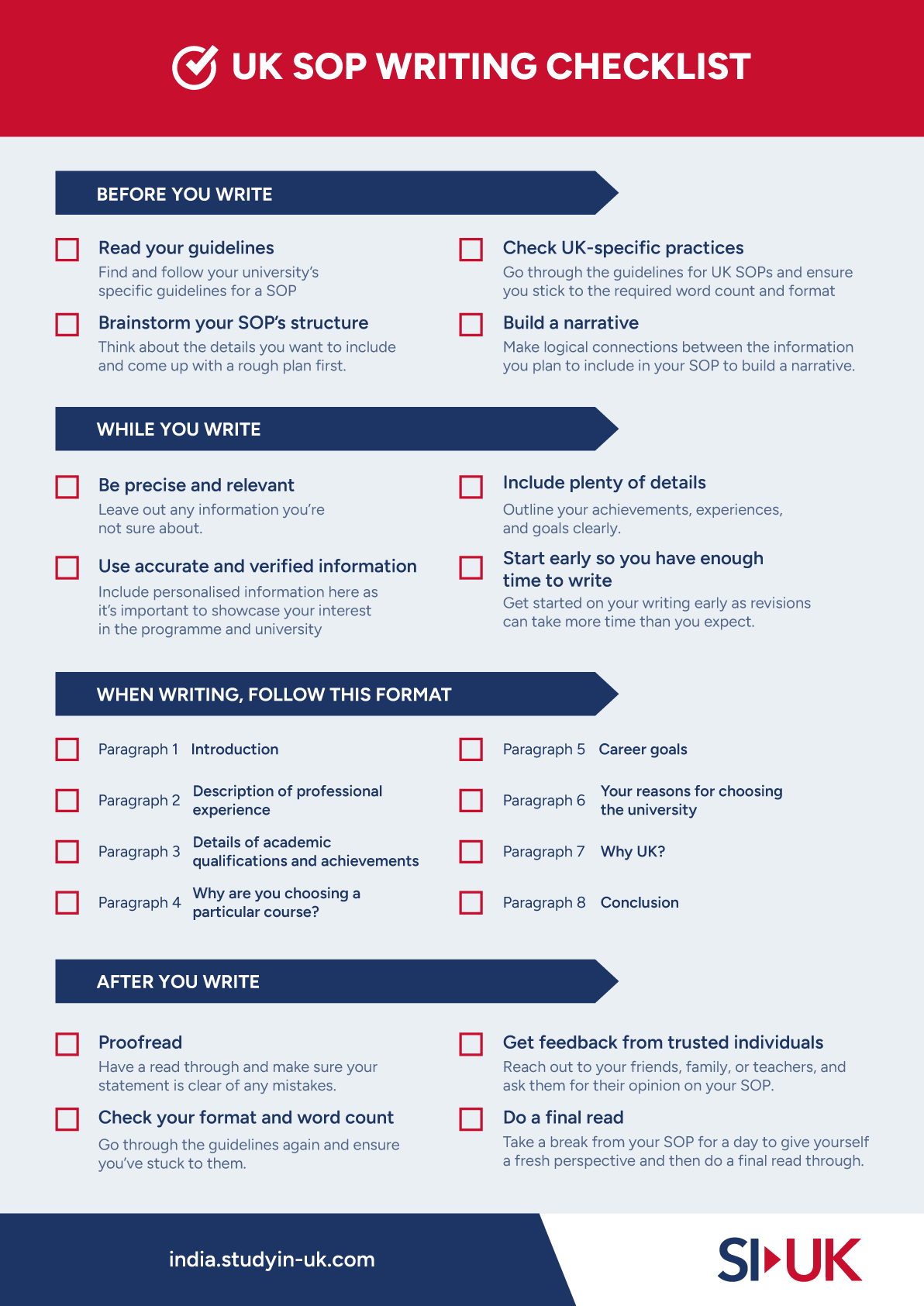A Statement of Purpose—or an SOP—is a personal essay that you send along with your application package when you apply to your preferred university in the UK. Think of your SOP as a cover letter, but for academic purposes—it highlights your academic achievements, career goals, and why you want to attend the university you are applying to.
Put this way, it can seem simple enough to write your SOP, but writing an SOP that convinces an admission panel to accept you into the university takes time, effort, and a keen understanding of the role your SOP plays in your university admission process. So let’s start by learning why your SOP is important, and then go through the format of a standard SOP for the UK, the writing process for an SOP, and how your SOP matters in your university admission interview. We’ve also included two sample SOPs and a printable checklist to help you write an SOP that presents your best self.
Let’s get started.

Why is your SOP important?
Exceptional academic qualifications and professional experience can get you noticed during the selection process, but a compelling SOP can help set you apart from hundreds of applicants with similar credentials. Your SOP is the best way to provide context to your achievements and experience and share why this particular university or programme is your go-to choice to start working towards your future goals. A well thought-out, well-written SOP can create a great first impression—and that’s exactly what you need to increase your chances of getting accepted. So let’s begin working on your SOP—starting from understanding what it exactly is.
Understanding your SOP for the UK
Your SOP can be the deciding factor that moves you from a ‘maybe’ to a ‘yes!’ in the admission process, and it’s important to understand what an SOP is and the role it plays when you apply to universities. We’ve put together the answers to a few questions you may have about the SOP and how it works:
- What is an SOP?
- When do you submit your SOP?
- To whom should you submit the SOP and how should you submit it?
- What happens after you submit your SOP?
Let’s take a closer look.
What is an SOP?
An SOP—a statement of purpose—is an essay that highlights your personal characteristics, your academic and professional achievements, the reason you want to follow a particular course, and most importantly, why you have chosen that specific university.
The goal of your SOP is to show how you’re a good fit for the programme and the university you are applying to. Ideally, as a personal pitch of yourself, the SOP should be able to convince the university to select you from among the many candidates applying to the same programme.
When do you submit your SOP?
Usually, you have to submit your SOP at the time of application to the university as part of your application package with other materials such as your transcripts and CV. The exact date will be different for each university, so make sure to check ahead of time.
To whom should you submit the SOP and how should you submit it?
Your SOP has to be submitted to the admissions team at the university, along with your other application materials. An SOP is often a mandatory requirement for most UK universities and they typically have an application guide or ‘How to apply’ section on their websites which leads to an application portal to complete your application. These application portals have information on the guidelines to follow when submitting your SOP such as the format and the length.
What happens after you submit your SOP?
Once you’ve submitted your SOP, universities may use plagiarism detection software to check for originality of content to help ensure that you’re submitting your own work. They also often compare your application materials against each other—for example, your IELTS scores with the written essay so they can detect if the latter isn’t your work. Finally, there may be an admissions interview where the admissions team cross-checks your answers with your SOP.
Now that we’ve understood what an SOP is, let’s look at the format of your SOP. Our next section is about formatting guidelines which would give you an idea of the content to include in it and how to structure it.
How to format your SOP for the UK
Before you start writing your SOP, it’s best to remember that a clear structure for your SOP with sentences and paragraphs that flow well is crucial for easy readability and clarity. Here’s a snapshot of what your SOP for UK should look like:
| Paragraph 1 | Introduction |
| Paragraph 2 | Description of professional experience |
| Paragraph 3 | Details of academic qualifications and achievements |
| Paragraph 4 | Why are you choosing a particular course? |
| Paragraph 5 | Career goals |
| Paragraph 6 | Your reasons for choosing the university |
| Paragraph 7 | Why the UK? |
| Paragraph 8 | Conclusion |
Your SOP must have a clear beginning, middle, and end. Achieving this is easy if you follow the format which we have detailed here:
- Paragraph 1 – Introduction: Write an engaging introduction that briefly details your academic and professional background while highlighting your vision for the future.
- Paragraph 2 – Description of professional experience: Explain the fine details of your professional experience in this section. Your goal should be to highlight what you have gained from your working life and how you can integrate those experiences positively into your plan for the future. This section may not be required if you are applying for an undergraduate programme, so make sure to go through the requirements in your application package or clarify with the admission team if needed.
- Paragraph 3 – Details of academic qualifications and achievements: In this section, you should highlight any academic awards and recognition you’ve earned while detailing your academic qualifications so far.
- Paragraph 4 – Why are you choosing a particular course?: Here, your goal should be to make it clear to the university why you’re excited about the course you want to pursue.
- Paragraph 5 – Career goals: Write about your vision for the future here, highlighting both your short-term and your long-term goals. Explain how the course you intend to follow will help you achieve them.
- Paragraph 6 – Your reasons for choosing the university: Express your reasons for choosing the university for the course you want to study. This is a good chance for you to show the university how their values reflect your own and how they can help enhance your academic and extracurricular work.
- Paragraph 7 – Why the UK?: Show how you intend to learn from living in the UK here, the aspects of the culture you enjoy, and why you specifically want to study in the UK
- Paragraph 8 – Conclusion: Conclude with a strong statement that reiterates your vision for the future and summarises your motivations for choosing the university. This is a chance for you to leave a memorable impression with the admissions team, so be positive and enthusiastic about your future opportunities at the university.
The next step is to get started on writing your SOP, so we’ve planned out the entire writing process and added a checklist you can use when you are compiling your SOP.
How to write an SOP for UK universities
Writing your SOP might feel like an impossible task, but when you plan out your steps and carefully organise the information you need to include, putting together an outstanding SOP can be much more straightforward. In this section, we will cover what to keep in mind before, during, and after the writing process, guiding you through the steps you can follow to make sure that your SOP stands out. Let’s get started with what to keep in mind before you start writing your SOP.
Things to keep in mind before writing your SOP
To make sure you start strong, it’s important to plan out what you want to write, note down details you need to include, and prepare yourself to get into the writing process. Let’s take a look:
- Read your guidelines: Most universities in the UK have university-specific guidelines to writing your SOP. They are usually included in your application packet and there’s a high chance resources similar to the University of Oxford’s how-to guide or LSE’s article on personal statements would be available to you as well.
Make sure to read the phrasing of the guideline in your application—it would list out the word limit and the main areas you need to cover in the SOP, like your academic goals and the purpose of applying to the programme. Note these requirements down so you have a clear understanding of what you need to write. - Check for UK-specific practices: The format for your SOP for the UK may be different from an SOP you’d write for a university in another country, so it’s important to check your application requirements carefully. UK universities usually accept SOPs between 600-900 words, so if you don’t have an indicated word count in your application, it’s best to stick to the standard practice. Additionally, keep in mind that you would have to use Standard British English when writing an SOP for the UK.
- Brainstorm: Once you have a clear understanding of the requirements, you can start brainstorming. This helps you identify the content you need to write in each section—think of the academic experiences, anecdotes, professional challenges, or motivations that reflect the information that the university is asking you to include.
- Build a narrative: As you brainstorm and plan out the details you can include, you’ll start to see how your information connects together. For example, you might talk about your academic goals, mentioning a role model who has inspired them—you can connect this inspiration to your professional goals and talk about what you plan to do after completing your studies. This would also allow you to show how the university and the programme can help you achieve your goals.
Building a narrative is important as it helps the admissions team understand the information you’re including and how it relates to your plans to study in the UK and your future goals. While it can seem challenging at first, planning out the structure of your SOP ahead of time can help you build a narrative much more easily.
If you’ve followed through with the steps we’ve covered so far, you are now ready to write your SOP. Let’s have a look at what you need to keep in mind when writing your SOP for the UK.
Things to keep in mind while writing your SOP
We’ve already covered how best to structure your SOP when writing it—let’s also look at some other dos and don'ts to follow.
| Dos | Don’ts |
|---|---|
| Be precise and include only relevant information | Include information you’re not sure of in your SOP |
| Research into your university and course | Include any information or details written by other people |
| Get started on writing it with ample time for revisions | Use jargon or technical terms that can be hard to understand |
| Build credibility by being genuine and explaining your goals | Include too little information in your essay |
It can be easy to get carried away when you are in the middle of writing and lose sight of the details you need to keep in mind, so be sure to keep this list of dos and don’ts at hand.
Things to keep in mind after writing your SOP
The writing process doesn’t end once you have written down your last word; it’s also important to make sure your essay is free of errors and meets the quality standards the admission team expects. Here are some steps you can follow when finalising your SOP:
- Proofread: Read your completed SOP a few times, checking for grammatical errors, overuse of complicated words, informal language, and spelling errors. Keep in mind you are required to write in Standard British English so remember to check if your spelling and grammar match accordingly. As you read through, check for lengthy sentences and paragraphs and if you feel they are too long, try to shorten them and make it easier to read.
- Check the format and word count: Go through the requirements in your application package again and make sure you’ve covered all the areas you are required to write about. Double-check the word count—try not to write more or less than the range indicated by the university.
- Ask for feedback: Get feedback from a trusted friend, teacher, or colleague. You can ask them if your SOP is clear and easy to understand, and whether it places you in a positive light. Getting feedback from a different perspective and someone who knows you well can help you improve your SOP in terms of personalisation and clarity.
- Do a final read: After editing and proofreading your SOP, keep it aside for a couple of days and look at it with fresh eyes. This will help you spot minor mistakes and sentences you can improve further before you submit your SOP.
This may seem like a lot of steps to follow and keep track of, but the trick is to give yourself enough time to brainstorm, write, and edit your SOP without having to rush. We’ve compiled a checklist with what we’ve covered in the section—print it out, keep referring to it as you write, and you won’t miss a detail.

Once you are confident that you put your best effort into writing and fine-tuning your SOP, it’s time to submit it. If you’re still not sure how to get started though, you can always reach out to one of our experts for a free consultation.
How does your SOP matter in your university admission interviews?
After you submit your application package which includes your SOP, some universities may call you for an admissions interview. Being asked to attend one is often a sign of an excellent application, but there’s a lot of competition from students at this stage and preparing early is key to helping you stand out to the admissions team.
One way you can prepare for your interview is to familiarise yourself with your SOP, as your interviewers would ask you about the things you’ve written in it. Since an SOP provides context for your academic, professional, and extracurricular achievements, interviewers would look at it to understand you better as a candidate and may ask you follow-up questions or for more information on the details you’ve included. Remember to brush up on the information in your SOP and be ready to expand on what you’ve written, especially your motivations and goals.
Having an interview with the admission panel can seem challenging, but going into it with a strong application and SOP can give you the confidence you need to ace it. Let’s go through a couple of sample SOPs for you to get a clear idea of what a well-written SOP looks like.
Conclusion
Your SOP might be the final factor contributing to your acceptance to a UK university, so you must understand what your SOP is for and how to write a statement of purpose that helps you stand out. If you run into any questions as you write your SOP or want to discuss your ideas with someone before getting started, you can reach out to our experts with our free UK university application service. Good luck with your SOP—we hope it’s the start of an exciting academic journey awaiting you in the UK.
FAQs
Is a personal statement the same as an SOP?
No, while they share a few common areas, they are different. An SOP focuses more on why you want to study in a particular programme or university and your academic and professional goals, while a personal statement places more emphasis on who you are as a person, highlighting your experiences, interests, and motivations.
Can I start my SOP with a story?
Yes, if it fits the narrative of your SOP. If the story you want to include is relevant to the information you want to include or a point you want to highlight, the context in a story can make these points stand out much more. That said, you shouldn’t try to force yourself to fit in a story if it isn’t relevant to the details you want to include.
Can I write quotes in SOP?
Yes, if it’s relevant and supports what you are writing about yourself in your SOP. It’s best to keep any quotes brief so you can speak about your goals and aspirations at length.
How to end a statement of purpose?
You can end your statement of purpose by recapping or summarising the information you’ve talked about so far, but be careful not to repeat yourself too much. It’s a good idea to re-state the key takeaway from your SOP and end it on a positive note.
How many words are required for SOP?
An SOP is usually 600-900 words long. Some universities may indicate a specific word limit and if they do, make sure to stick to it.



 I sincerely thank SI-UK for getting me accepted to UCL. The MSc in Urban Development and Planning is extremely competitive, but the right guidance provided by SI-UK made my dream of studying at University College London a reality. The services were exceptional from beginning to end.
I sincerely thank SI-UK for getting me accepted to UCL. The MSc in Urban Development and Planning is extremely competitive, but the right guidance provided by SI-UK made my dream of studying at University College London a reality. The services were exceptional from beginning to end. 

